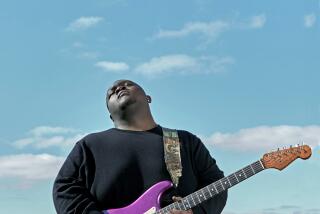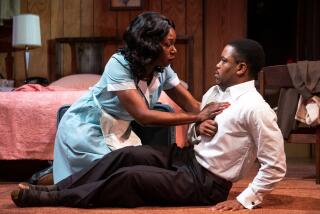POP MUSIC REVIEW : Forget the Fretting When a Master Plays the Blues
- Share via
Given that B.B. King received a standing ovation just for walking on stage at the Coach House in San Juan Capistrano over the weekend, the renowned bluesman probably could have coasted during his two sold-out shows, given perfunctory performances and still pleased the eager fans.
But apparently King really does love to play and sing the blues. A dyed-in-the-wool pro, he dug into each number with the gusto and verve for which he has long been famous. If this enthusiastic audience was, as he put it Friday night, “the nicest New Year’s gift I could ask for,” his bravura set in turn gave the listeners a dandy present of their own.
Eschewing more recently recorded numbers, King and his tight seven-piece band drew on his established workhorses, such classic blues as “Paying the Cost to Be the Boss,” “Outside Help,” “Let the Good Times Roll” and “The Thrill Is Gone.”
He wisely varied tempos, switching between slow tunes and ones bolstered by a thumping back-beat. But whether a tune started out at a whisper or at a medium roar, before long it was at a high-volume level. This one-dimensionality was definitely a drawback, though it did little to dampen the ardor of the audience.
Sound is at the heart of a King performance. From the famed black Gibson guitar he calls Lucille, he pulled notes that wailed like someone weeping, energized chords that were thick and rich and lighter, ringing tones strung together in flowing lines. A single solo would combine these elements. Sometimes, as on “Good Times Roll,” he played mostly short, telling bursts, while at other moments, as on “Paying the Cost,” we got a six-chorus solo chock full of lengthy, intricate ideas.
His voice was equally distinctive-- deep, rough and gravelly here, sweet and clear there. (It’s interesting to note that while singing, King no longer plays obbligatos between vocal statements: backup guitarist Leon Warren, keyboardist Eugene Carrier or the three horn players added such fills as there were.)
King was almost as much fun to watch as he was to listen to. His movements and facial contortions emphasized, even mimicked, the notes he played. When bending a note he might, with eyes closed, raise his eyebrows and purse his lips; applying a wagging vibrato to a tone, with his left hand whirring, he might shake his head back and forth feverishly; hitting a high, singing note, he might lean back, again eyes shut, as if serenely content, a winsome smile on his face; playing an edgy, rhythmic flurry, he would move his head as fast as the notes.
While he gave solo space to each of his sidemen--Carrier, Warren, trumpeter James Bolden and saxman Walter King (B.B.’s nephew) each had solid moments--the weight of the show’s success fell on his shoulders. And it was his own, dynamo-like efforts that galvanized the crowd and showed why he is still worthy of the mantle “King of the Blues.”
More to Read
The biggest entertainment stories
Get our big stories about Hollywood, film, television, music, arts, culture and more right in your inbox as soon as they publish.
You may occasionally receive promotional content from the Los Angeles Times.








